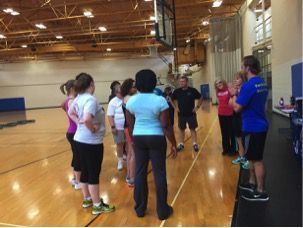Fit for Life program encourages healthier campus community

Graduate student and personal trainer Curt Fennell helps Fit for Life participants get organized to begin the exercise workshop on Wednesday, June 17, 2015.
June 18, 2015
Summer often sends people scrambling to the gym to get their beach body. However, a single trip to the gym won’t have them seeing any major changes, leading them down a path to failure.
Kent State’s Fit for Life program, a new one-credit workshop and an organization of the School of Health Sciences, is geared toward giving participants success and maintaining a long-lasting, healthy lifestyle.
“We’re looking at Fit for Life across a lifespan,” said Ellen Glickman, a health sciences professor and program coordinator. “The youngest person in this program is about 22, and the oldest is about 60. Sure, as we get older everything may physiologically decline, this decline may be attenuated. We believe that exercise is medicine.”
Fit for Life evolved from another faculty and staff exercise program. The group is unique from other fitness programs in that it is inclusive of the entire Kent State community, including faculty and staff, spouses, partners and students.
Glickman said the program cares about creating a community of individuals that are able to have fun and drive each other to exercise more often.
“It’s a group of individuals that care for one another, who are also competing with one another,” she said.
Each 60-minute class begins with warm-ups followed by a choice of aerobics (walking, jogging, cycling or aqua aerobics). An anaerobic workout using light weights strengthens given muscle groups through the range of motion. The class ends with a cool-down session of stretching and relaxation exercises.
In addition to participating in the fitness program, members take part in a series of functional fitness tests both at the beginning and completion of the term. These tests include a standard lipid profile and a series of exercise tests aimed at evaluating flexibility, aerobic endurance and anaerobic strength.
Participants also receive a Movband, a fitness tracker, to help increase awareness of their daily activity level and to inspire the healthy decision to keep moving.
Nancy Miller, academic program director of administrative affairs and graduate education and a participant in Fit for Life, said she has been involved in the program for three semesters.
“Let’s just say I’ve lost 20 pounds since I’ve started,” she said. “This past semester, I went from a size 8 to a size 4, and since they turned it into a workshop, I got my husband signed up for it. We all need to exercise, and I’ll tell you what, I feel so much better.”
Glickman discussed how the trainers use a one-on-one approach to take care of the members.
“They love these guys,” she said. They can have fun and relate to them.”
Exercise physiology graduate student Curtis Fennell is a certified personal trainer in the Fit for Life program. He said all exercise students are required to do an internship, and students often participate in this program as trainers to complete that internship.
“This provides the student with hands-on experience in the area of research or good clinical experience,” he said. “They help teach anything from a boot camp class, weights class or conduct the aqua class. They essentially assist us in the program. They help with data entry and data collection. Some have even gone with us to our Annual Conference in San Diego, California, to present our data.”
Fennell said working with the program is a good way for students to network with faculty.
“It’s a great experience for them just to work one-on-one or with groups of faculty members, as well as a great way to network,” he said.
The trainers are part of what makes the program so enjoyable, said Mary Lovin, administrative assistant for University Libraries and member of Fit For Life.
“All of the certified personal trainers do a wonderful job; they are really incredible,” she said. “They make it fun, and there’s a large variety of things we can choose from, so you never get bored with the same routine.”
The Fit for Life program is currently conducting summer workshops on campus. The workshops are offered every term and meet in the M.A.C. Center Annex on Monday, Wednesday and Friday from 6-7 a.m., 12-1 p.m. and 5:30-6:30 p.m.
“As the word goes around and people learn more about the program, we’re hoping to ‘move’ Kent State,” Glickman said. “We need to move more if we hope to live longer and have a better quality of life.”
Contact Jessa Schroeder at [email protected].












